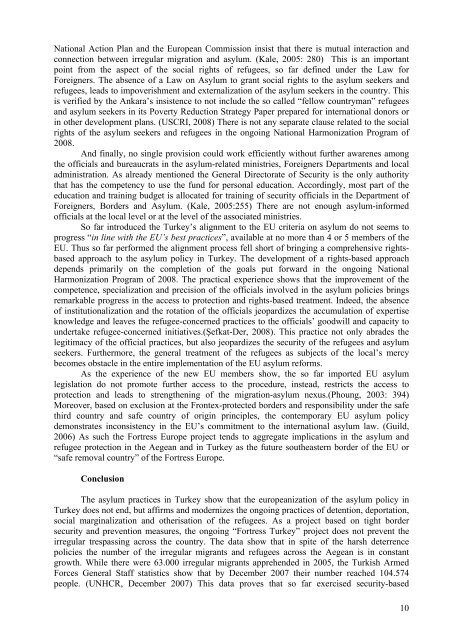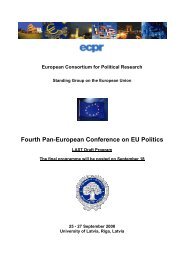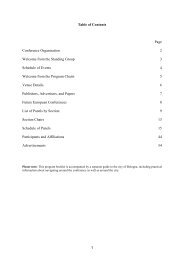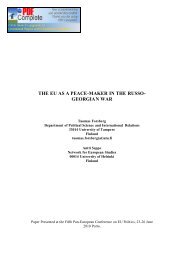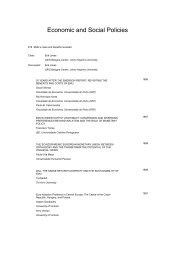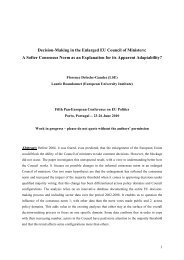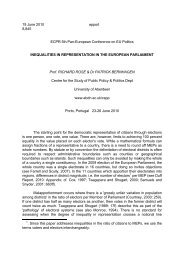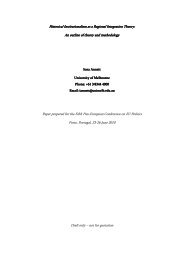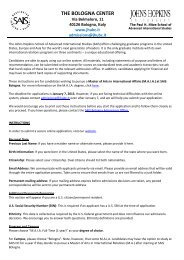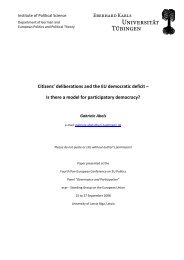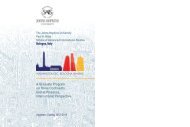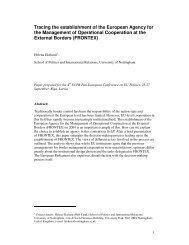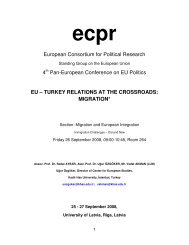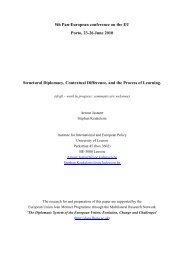1 “Building “Fortress Turkey”: Europeanization of Asylum Policy in ...
1 “Building “Fortress Turkey”: Europeanization of Asylum Policy in ...
1 “Building “Fortress Turkey”: Europeanization of Asylum Policy in ...
You also want an ePaper? Increase the reach of your titles
YUMPU automatically turns print PDFs into web optimized ePapers that Google loves.
National Action Plan and the European Commission <strong>in</strong>sist that there is mutual <strong>in</strong>teraction and<br />
connection between irregular migration and asylum. (Kale, 2005: 280) This is an important<br />
po<strong>in</strong>t from the aspect <strong>of</strong> the social rights <strong>of</strong> refugees, so far def<strong>in</strong>ed under the Law for<br />
Foreigners. The absence <strong>of</strong> a Law on <strong>Asylum</strong> to grant social rights to the asylum seekers and<br />
refugees, leads to impoverishment and externalization <strong>of</strong> the asylum seekers <strong>in</strong> the country. This<br />
is verified by the Ankara’s <strong>in</strong>sistence to not <strong>in</strong>clude the so called “fellow countryman” refugees<br />
and asylum seekers <strong>in</strong> its Poverty Reduction Strategy Paper prepared for <strong>in</strong>ternational donors or<br />
<strong>in</strong> other development plans. (USCRI, 2008) There is not any separate clause related to the social<br />
rights <strong>of</strong> the asylum seekers and refugees <strong>in</strong> the ongo<strong>in</strong>g National Harmonization Program <strong>of</strong><br />
2008.<br />
And f<strong>in</strong>ally, no s<strong>in</strong>gle provision could work efficiently without further awarenes among<br />
the <strong>of</strong>ficials and bureaucrats <strong>in</strong> the asylum-related m<strong>in</strong>istries, Foreigners Departments and local<br />
adm<strong>in</strong>istration. As already mentioned the General Directorate <strong>of</strong> Security is the only authority<br />
that has the competency to use the fund for personal education. Accord<strong>in</strong>gly, most part <strong>of</strong> the<br />
education and tra<strong>in</strong><strong>in</strong>g budget is allocated for tra<strong>in</strong><strong>in</strong>g <strong>of</strong> security <strong>of</strong>ficials <strong>in</strong> the Department <strong>of</strong><br />
Foreigners, Borders and <strong>Asylum</strong>. (Kale, 2005:255) There are not enough asylum-<strong>in</strong>formed<br />
<strong>of</strong>ficials at the local level or at the level <strong>of</strong> the associated m<strong>in</strong>istries.<br />
So far <strong>in</strong>troduced the Turkey’s alignment to the EU criteria on asylum do not seems to<br />
progress “<strong>in</strong> l<strong>in</strong>e with the EU’s best practices”, available at no more than 4 or 5 members <strong>of</strong> the<br />
EU. Thus so far performed the alignment process fell short <strong>of</strong> br<strong>in</strong>g<strong>in</strong>g a comprehensive rightsbased<br />
approach to the asylum policy <strong>in</strong> Turkey. The development <strong>of</strong> a rights-based approach<br />
depends primarily on the completion <strong>of</strong> the goals put forward <strong>in</strong> the ongo<strong>in</strong>g National<br />
Harmonization Program <strong>of</strong> 2008. The practical experience shows that the improvement <strong>of</strong> the<br />
competence, specialization and precision <strong>of</strong> the <strong>of</strong>ficials <strong>in</strong>volved <strong>in</strong> the asylum policies br<strong>in</strong>gs<br />
remarkable progress <strong>in</strong> the access to protection and rights-based treatment. Indeed, the absence<br />
<strong>of</strong> <strong>in</strong>stitutionalization and the rotation <strong>of</strong> the <strong>of</strong>ficials jeopardizes the accumulation <strong>of</strong> expertise<br />
knowledge and leaves the refugee-concerned practices to the <strong>of</strong>ficials’ goodwill and capacity to<br />
undertake refugee-concerned <strong>in</strong>itiatives.(Şefkat-Der, 2008). This practice not only abrades the<br />
legitimacy <strong>of</strong> the <strong>of</strong>ficial practices, but also jeopardizes the security <strong>of</strong> the refugees and asylum<br />
seekers. Furthermore, the general treatment <strong>of</strong> the refugees as subjects <strong>of</strong> the local’s mercy<br />
becomes obstacle <strong>in</strong> the entire implementation <strong>of</strong> the EU asylum reforms.<br />
As the experience <strong>of</strong> the new EU members show, the so far imported EU asylum<br />
legislation do not promote further access to the procedure, <strong>in</strong>stead, restricts the access to<br />
protection and leads to strengthen<strong>in</strong>g <strong>of</strong> the migration-asylum nexus.(Phoung, 2003: 394)<br />
Moreover, based on exclusion at the Frontex-protected borders and responsibility under the safe<br />
third country and safe country <strong>of</strong> orig<strong>in</strong> pr<strong>in</strong>ciples, the contemporary EU asylum policy<br />
demonstrates <strong>in</strong>consistency <strong>in</strong> the EU’s commitment to the <strong>in</strong>ternational asylum law. (Guild,<br />
2006) As such the Fortress Europe project tends to aggregate implications <strong>in</strong> the asylum and<br />
refugee protection <strong>in</strong> the Aegean and <strong>in</strong> Turkey as the future southeastern border <strong>of</strong> the EU or<br />
“safe removal country” <strong>of</strong> the Fortress Europe.<br />
Conclusion<br />
The asylum practices <strong>in</strong> Turkey show that the europeanization <strong>of</strong> the asylum policy <strong>in</strong><br />
Turkey does not end, but affirms and modernizes the ongo<strong>in</strong>g practices <strong>of</strong> detention, deportation,<br />
social marg<strong>in</strong>alization and otherisation <strong>of</strong> the refugees. As a project based on tight border<br />
security and prevention measures, the ongo<strong>in</strong>g <strong>“Fortress</strong> <strong>Turkey”</strong> project does not prevent the<br />
irregular trespass<strong>in</strong>g across the country. The data show that <strong>in</strong> spite <strong>of</strong> the harsh deterrence<br />
policies the number <strong>of</strong> the irregular migrants and refugees across the Aegean is <strong>in</strong> constant<br />
growth. While there were 63.000 irregular migrants apprehended <strong>in</strong> 2005, the Turkish Armed<br />
Forces General Staff statistics show that by December 2007 their number reached 104.574<br />
people. (UNHCR, December 2007) This data proves that so far exercised security-based<br />
10


